#promiscuo
Text
PROMISCUO
promiscuo /pro'miskwo/ agg. [dal lat. promiscuus, der. del tema di miscēre "mescolare", col pref. pro-¹]. - [costituito dalla mescolanza di cose diverse: società p.; matrimonio p.] ≈ eterogeneo, ibrido, mescolato, misto.
0 notes
Note
entonces trolo/trola es el equivalente perfecto a puto/puta
para hombres: homosexual
para mujeres: promiscua
ah, el idioma español 🙃
EXACTAMENTE
52 notes
·
View notes
Text
realtalk por un minuto: tener una ets sin cobertura medica es de las top 10 peores cosas que te pueden pasar. cuidense en serio. conozco a alguien que esta hace 3 meses lidiando con una gonomidia incurable que va y viene y entre que le dan turno cada una vez por mes, la lentitud de los examenes, los chorrocientos millones de pesos para atenderse por privado y la incompetencia medica repetida está siendo literalmente un infierno
#es como ok. hay servicios de infectologia que sirven. porque te podes morir. pero para cualquier cosa que no sea sifilis7hiv fuiste#y mi me han tratado TAN como el orto aunque por suerte tengo cobertura y me he podido tratar enseguida porque no hay nada peor que#un transexual promiscuo enfermo! aunque seguramente el resto de sus pacientes jamas vieron un forro y viven empastilladas
0 notes
Text
sooo #gone so obligartory drunk post <3333
#theyre playin promiscuous gurl rn woooooo#promiscuos girlll ur teeaaasin meeee gpromiscuous boyyy lets get to the point#txt
1 note
·
View note
Text
Mo Ran is so gay it isn't even funny.

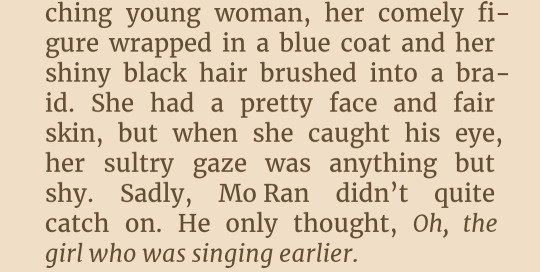
Now, this is just my opinion and I realise other people have their own interpretations, but this whole episode is super telling to me of just how unreliable his narration is about having tons and tons of sex with people of both genders in his previous lifetime. He's just so... oblivious. None of this reads as a man with a lot of previous experience with many different people. He did not pick up on her flirting with him at all. Sure, he did have a lot of insane sex in his past life, but as the book unfolds, it becomes very clear that most of that sex was with Chu Wanning. At best, there were only a handful of other people he was involved with, and one was a prostitute he was paying, while the other was his wife whose relationship with him was also transactional.
I know people argue that he is bisexual because he married Song Qiutong, but when we actually get her POV on their marriage, it turns out that they had unenjoyable sex only a handful of times, at least one of which was him taking her from behind and very much imagining that it was Chu Wanning in her place. There are plenty of gay men who end up married to straight women (and vice versa) for whatever reasons and none of this makes them any less gay. He also identifies as a 'cut-sleeve' himself at one point, so he doesn't seem at all confused about his sexual attraction to men. Later on, when we finally get his unaltered POV on his life in the brothel, it comes out that he considered the girls there as sisters at best, never as sexual partners. The only other named sexual partner is Rong Jiu, who is male, and I can buy that there were possibly other people who looked like Shi Mei that he was with under the influence of the cursed love spell, but there was never any real attraction there, which is why some argue that he is attracted only to Chu Wanning and would still be attracted to him regardless of gender.
But I think that this is also not true. He definitely was obsessed with Chu Wanning from an early age, which makes it hard to see what his preferences would have been if Chu Wanning wasn't in the picture, but that chapter when he finally realises his feelings also reveals that he does have a type, which he never dared to think about before because he thought he was unworthy of having a choice. However, Chu Wanning fits this type to a tee, so it's easy to run away with the idea that he is shizunsexual and that Mo Ran's attraction begins and ends with him.
With that said, we do get confirmation later on that he does find other men attractive, in particular, Jiang Xi. It's just that he never has the space or the inclination to do anything about it because of his preoccupation with Chu Wanning. In the extras, when Mo Ran misunderstands Xue Men's relationship with Jiang Xi and thinks they are having a love affair, in his unfiltered Taxian-jun state, he is full of approval because he personally finds these powerful, beautiful, prickly, emotionally unavailable older men to be the height of attractiveness. If Chu Wanning hadn't been in the picture, Mo Ran would have definitely been attracted to Jiang Xi or someone similar. Even Ye Wangxi, whom he also fixates on, fits this type (except for the older man bit because I understood her to be only a few years older than Mo Ran). The fact that she turns out to be a woman also cannot be used as an argument for Mo Ran's bisexuality because she very much presents as a man throughout the book (but whether or not she actually identifies as one is debatable).
In short, Mo Ran does have a type of man he is attracted to and it is definitely men that he likes, regardless of his few dubious and very unsatisfying dalliances with women. While Chu Wanning definitely fits this type of ideal man, there are other men out there whom Mo Ran finds attractive too, it's just that he is too unhinged about Chu Wanning to actually do anything about it. Also, I very much doubt that Mo Ran was nearly as promiscuous as he makes himself out to be because he reads as very oblivious when it comes to sexual relationships in general. Even with Chu Wanning, who was right there and about to pass away from sheer horniness that he couldn't even begin to disguise, Mo Ran was still going, "Shizun is so pure and virtuous!" 🙄
(I'm not going to get into the whole Shi Mei situation and how badly he misread him every step of the way too, but that is because his brain was so badly mangled by him that he really stood no chance on that front until it was entirely too late.)
74 notes
·
View notes
Text
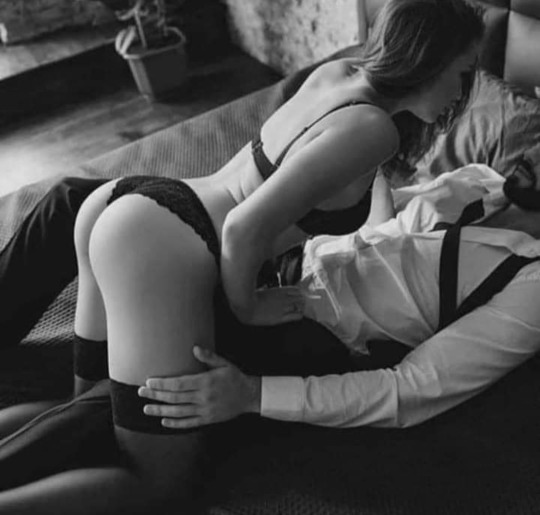
Dei Pubi Angelici
Divagare per il doppio corso delle tue
gambe, percorrere l'ardente miele
pulito, soffermarmi, e nel promiscuo
bordo, dove l'enigma nasconde il
suo portento, contenermi.
Il dito esita, non si azzarda, la cosi fragile
censura trapassando - aderito triangolo
che l'elastico liscia - sapendo cosa lo
aspetta. Comprovando, infine, il
sesso degli angeli.
Ana Rossetti
30 notes
·
View notes
Text
Antes de conocerte fui muy promiscuo, estando contigo te engañe y te perdí, ahora que no te tengo no quiero que cualquier persona toque mi cuerpo, solo las personas que toquen mi alma me merecen, ya dejando de la lado esa vida pasada, no me sentiria bien dándole mi cuerpo a cualquiera, quiero guardar en mi memoria y en mi piel las caricias de la última vez que me hiciste el amor, quiero guardar eso en mi, hasta que llegue de nuevo alguien que toque mi alma, tal vez demore, tal vez no llegue, tal vez yo muera sabiendo que el último hombre que toco mi cuerpo realmente me amo, gracias Kevin por hacerme crecer, gracias por hacerme madurar a las malas, por hacerme estrellar tan duro con este realidad, siempre te extrañare, amaré y esperaré.
17 notes
·
View notes
Text
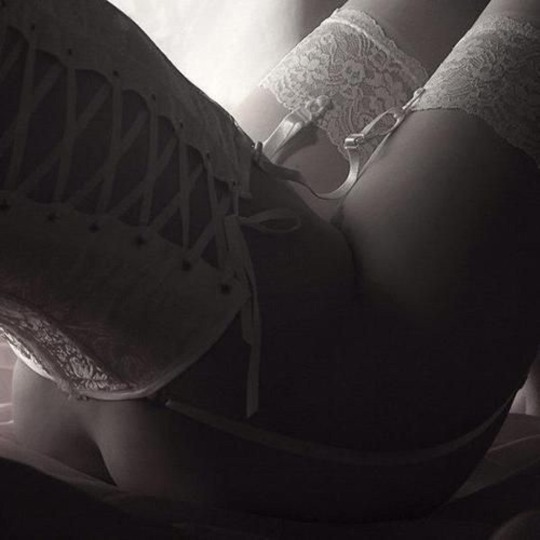
Dei Pubi Angelici
Divagare per il doppio corso delle tue
gambe, percorrere l'ardente miele
pulito, soffermarmi, e nel promiscuo
bordo, dove l'enigma nasconde il
suo portento, contenermi.
Il dito esita, non si azzarda, la cosi fragile
censura trapassando - aderito triangolo
che l'elastico liscia - sapendo cosa lo
aspetta. Comprovando, infine, il
sesso degli angeli...
Ana Rossetti
57 notes
·
View notes
Text
Después de todo esto debo admitir que soy un suicida frustrado. Es una confesión triste, pues en realidad, se diría, no hay nada más fácil que quitarse la vida. Séneca, autoridad final en la materia, señaló desdeñosamente que hay salidas por todas partes: cada precipicio y cada río, cada rama de cada árbol, cada vena del propio cuerpo pueden liberarlo a uno. Pero en los hechos no es así. Nadie es promiscuo en la muerte. El que ha decidido ahorcarse no se lanzará al paso de un tren. Y cuanto más sofisticado e indoloro el método, mayor la posibilidad de fracaso.
El dios salvaje, Al Álvarez.
#el dios salvaje#al álvarez#read 2023#frases libros#frases literatura#frases literarias#libros#literatura#ensayo#suicidio
30 notes
·
View notes
Text
Me estaba comiendo un plátano y era muy grande, tengo que admitir que tuve pensamientos muy promiscuos kdhfkfjffk
Es por mucho Tumblr, yo soy una niña buena:(
24 notes
·
View notes
Text
“The future belonged to the showy and the promiscuous”: Why the 21st Century Loves Edith Wharton
Emily J. Orlando
E. Gerald Corrigan Chair in the Humanities & Social Sciences and Professor of English
Fairfield University
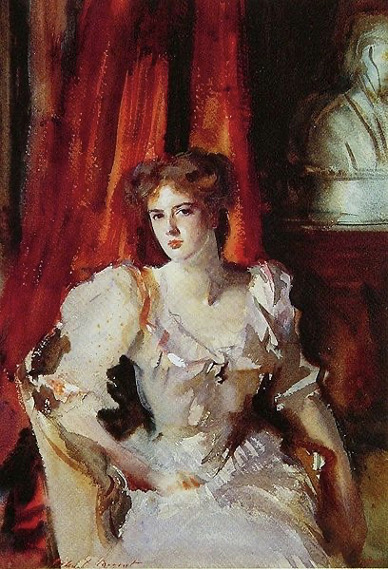
Photo: John Singer Sargent, Sybil Frances Grey, later Lady Eden 1905.
If ever there were a good time to read the American writer Edith Wharton (1862-1937), who published over forty books across four decades, it’s now. Since the Wharton revival of the late 20th century, when directors were adapting (the Pulitzer-Prize winning) The Age of Innocence, Ethan Frome, The Buccaneers, and The House of Mirth, her star has continued to rise. As I yesterday prepared to teach The Custom of the Country, which many have called Wharton’s greatest novel, a friend texted me Sofia Coppola’s article on the surprising appeal of its social-climbing heroine. Coppola is developing Undine Spragg’s story for Apple TV. A kind of Gilded Age Material Girl, Undine has been ready for her close-up for years.
Coppola joins an impressive roster of contemporary admirers of Wharton that includes Roxane Gay, Laura Bush, Lisa Lucas, Peggy Noonan, Jennifer Egan, Stephin Merritt, Claire Messud, Meg Wolitzer, Mindy Kaling, Doug Hughes, Brandon Taylor, Ta-Nehisi Coates, Ali Benjamin, Vendela Vida, Ottessa Moshfegh, and Kristin Hannah. At a time when publishing houses are compelled to scale back, new editions of Wharton’s books are appearing in print with introductions by Coppola, Egan, and Taylor.

Photo: Sofia Coppola.
Those who think they don’t know Wharton might be surprised to learn they do. A reverence for Wharton’s writings informs Sex and the City (whose pilot welcomes us to “the Age of Un-Innocence”), Gossip Girl, Downtown Abbey (whose “Lady Edith” suggests a nod to Wharton), and HBO’s The Gilded Age which, like Downton, is created by the Wharton-appreciating Julian Fellowes. His Bertha and George, after all, are named for the power couple from The House of Mirth.
But why Wharton? Why now? Perhaps it’s because for all its new technologies, conveniences, and modes of travel and communication, our own “Gilded Age” is a lot like hers. For the post-war and post-flu-epidemic climate that engendered The Age of Innocence is not far removed from our post-COVID-19 reality. In both historical moments, citizens of the world have witnessed a retreat into conservativism and a rise of white supremacy. Fringe groups like the “Proud Boys” and “QAnon” and deniers of everything from the coronavirus to climate change and Sandy Hook are invited to the table in the name of free speech, and here Wharton’s distrust of false narratives resonates particularly well. Post-9/11 calls for patriotism and the alignment of the American flag with one political party harken back to Wharton’s poignant questioning, in a 1919 letter, of the compulsion to profess national allegiance:
how much longer are we going to think it necessary to be “American” before (or in contradistinction to) being cultivated, being enlightened, being humane, & having the same intellectual discipline as other civilized countries?[i]
Her cosmopolitan critique of nationalist fervor remains instructive to us today.
Edith Wharton seems to have foreseen the excesses, obsessions, and spectacles of our current moment. The scandals documented in Wharton’s narratives serve as harbingers of the sensations that flash across our hand-held screens. Jeffrey Epstein’s sex trafficking touches on the same nerve as the sexual exploitation of minors in Wharton’s Summer (1917) and The Children (1928). The quid pro quo run-in between Wharton’s Lily Bart and Gus Trenor looks uncomfortably forward to Harvey Weinstein and #MeToo. The rise to power of Donald Trump would not surprise Edith Wharton.
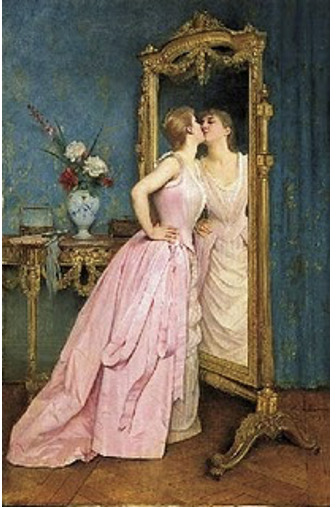
Photo: “Vanity,” by Auguste Toulmouche, circa 1870.
Wharton’s tenacious Undine Spragg—as horrifying to progressive era readers as she is admired by Generation Z—can be conceived of as the original social media influencer conscious of her brand. For Undine and her creator know that “the future belonged to the showy and the promiscuous”[ii] and that the turn-of-the-century “world where conspicuousness passed for distinction”[iii] foreshadows our own. Wharton would describe Undine in terms we might use for a “Real Housewife of Park Avenue”: “If only everyone would do as she wished she would never be unreasonable” (162). Undine’s world encourages her to aspire to the rank of trophy wife and the sexual double standard dictating that “genius is of small use to a woman who does not know how to do her hair”[iv] would apply to Wharton herself who, on the 150th anniversary of her birth, would be assessed by a male novelist in terms of how she sizes up to Grace Kelly or Jackie Kennedy.[v] The writer who would declare, in her wildly popular interior design manual The Decoration of Houses, privacy “one of the first requisites of civilized life”[vi] would be appalled by what is broadcast across social media. Wharton also would’ve anticipated the racism directed at Meghan Markle and why granting Oprah an interview would not help relations with her spouse’s family. Children forcibly separated from families due to morally dubious immigration policies echo the plight of war refugees for whose welfare Edith Wharton labored, while the distrust of the cultural other echoes the writer’s own complicated nationalist allegiances.[vii]
Ten years ago, Lev Raphael took the temperature of Wharton studies declaring in the Huffington Post: “Edith Wharton is hot.” She is now positively on fire. I offer below a short excerpt from the introduction to The Bloomsbury Handbook to Edith Wharton, which appears in print today.
*********************
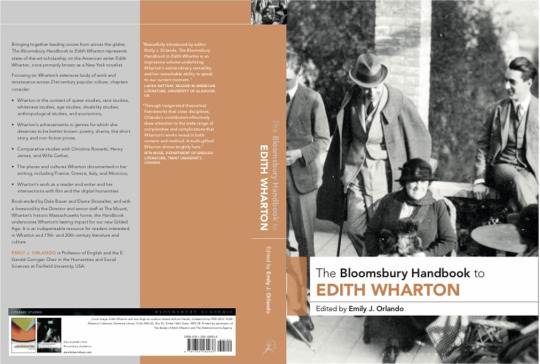
The image gracing the cover of The Bloomsbury Handbook to Edith Wharton, capturing a scene on the terrace of Edith Wharton’s French home, reflects the cultural work that this book takes as its task. The writer is in her element: she cradles in her lap her beloved dogs, she sits outdoors at a well-appointed property she lovingly transformed, she surrounds herself with fashionably dressed cosmopolitans, and she smiles. The moment validates an idea expressed in The Age of Innocence: that “the air of ideas is the only air worth breathing.” As host, Wharton, by this point an internationally acclaimed artist, has brought together representatives of an admiring generation from diverse backgrounds that would outlive and perhaps learn from her. That sunlit terrace is doing something we hope this book will do: provide a foundation for future conversations with Edith Wharton at the center.

Photo: Edith Wharton publicity shot.
Around the time this photograph was taken, Wharton would reflect in A Backward Glance that “[t]he world is a welter and has always been one; but though all the cranks and the theorists cannot master the old floundering monster, . . . here and there a saint or a genius suddenly sends a little ray through the fog, and helps humanity to stumble on, and perhaps up” (379). Wharton’s writings arguably send a ray and help humanity stumble on and up in our own Gilded Age. It is the aim of this collection of essays, produced by leaders in the field at a time of global crisis, to make a meaningful contribution to the scholarship on and dialogue about the work of Edith Wharton and to open up new possibilities for understanding and embracing a writer whose corpus is as enormous as it is resonant. To borrow from Wharton’s preface to her anthology The Book of the Homeless (1916), in which she conceives of her volume, as she so often does, as a house: “You will see from the names of the builders what a gallant piece of architecture it is. . . . So I efface myself from the threshold and ask you to walk in.”[viii]
Emily J. Orlando is the E. Gerald Corrigan Chair in the Humanities & Social Sciences and Professor of English at Fairfield University. She is the author of Edith Wharton and the Visual Arts and editor of The Bloomsbury Handbook to Edith Wharton. She is currently preparing for publication a new edition of Edith Wharton’s first book, The Decoration of Houses.
[i]Lewis, Letters, 424.
[ii]Edith Wharton, The Custom of the Country, New York, Penguin, 2006, 117.
[iii]Edith Wharton, The House of Mirth, ed. Elizabeth Ammons, 2nd Norton Critical ed. (New York: Norton, 2018), 186.
[iv]Edith Wharton, The Touchstone, in Wharton, Edith, Collected Stories, 1891-1910, ed. Maureen Howard (New York: Library of America, 2001), 170.
[v]Jonathan Franzen, “A rooting interest: Edith Wharton and the problem of sympathy,” The New Yorker, February 5, 2012.
[vi] Edith Wharton and Ogden Codman, Jr., The Decoration of Houses (New York: Charles Scribner’s Sons, 1897), 22.
[vii]See Melanie Dawson, “The Limits of Cosmopolitan Experience in Wharton’s The Buccaneers.” Legacy 31.2 (2014): 258-80. Print.
[viii]Edith Wharton, Preface to The Book of the Homeless (Le Livre des Sans-foyer) (New York, Charles Scribner’s Sons, 1916), xxiv-xxv.
#Emily J. Orlando#Fairfield University#Edith Wharton#Gossip Girl#The Custom of the Country#Sofia Coppola#The Age of Innocence#Undine Spragg#Summer#The Book of the Homeless
57 notes
·
View notes
Note
it's chan brainrot era!!!!
he swears to god that he doesn't have daddy kink BUT when he's scolding you for something and you go "yeah ok daddy" in a sarcastic way he just went feral bc 1. he doesn't like sarcasm when he's serious 2. the way you say daddy just sounded so promiscuos that his cock twitch in his pants
when he's in that vague in-between stage where he hasn't fully realized his kink yet but you have so you make sure to throw in a "yes daddy" more often 😇
31 notes
·
View notes
Text

"Minas y mineros, palos, hambre y represión en un lugar de la Mancha... Puertollano y comarca".
Eran tiempos de ropa azul y mano alzada. De vez en cuando nos cruzábamos por las calles con gentes de vientre inflamado y cara famélica y con profundas ojeras."Mira niño, me decían, ese que va por ahí se va a morir esta noche". Y yo nunca entendía el por qué de tan macabra afirmación. Luego, mucho más tarde, sí que lo entendí.
En aquel Puertollano de mi infancia se daban todas las prerrogativas para que sucedieran esas escenas. La hambruna de los años cuarenta causaba estragos en general y aquí, en el pueblo, en particular. Lugar de paso, de aluvión, al socaire del trabajo en las minas, la ciudad, estratégicamente situada a caballo entre Andalucía, Extremadura y la enorme extensión al sur de la llanura Manchega, había congregado durante la última etapa de la Guerra Civil a un buen número de refugiados que, terminada la contienda, intentaban sobrevivir en su lugar de acogida.
Gentes humildes, desarraigadas, en búsqueda desesperada de asiento que les permitiera acceder a trabajo y pan estables, formaban ese importante contingente de población flotante a los que la miseria les maquillaba trágicamente su aspecto.
Con ellos los demás. La clase obrera, mayoritaria, y la escasa burguesía que componían altos directivos de la Industria, Comerciantes, Vendedores de Mercado, Empleados de Renfe y Hacendados de la escasa actividad agrícola y ganadera de la comarca.
La ropa azul predominaba en el atuendo mayoritario de las gentes por la sencilla razón de ser la más asequible en aquellos duros años. Se empleaba para lo que se llamaba "vestir" y luego, cuando se desgastaba, para usarla en el trabajo diario. Aún me parece estar viendo a los mineros recién aseados, sentados a las puertas de sus casas cuarteleras, sobre tarugos de entibación, con los pantalones zurcidos por varias partes, las camisetas de tela azul, calzando sus alpargatas "rocaví" - aquellas que se anunciaron después en Radio Parroquial como propias para vagonear- degustando un botellín de gaseosa de Florián mezclada con vino peleón de la tierra… y próximos sus proles, niños semi-desnudos manchados de tierra y barro por todo el cuerpo, jugando a las canicas por el suelo y acercándose a ellos de vez en cuando por si podían recibir alguno de los garbanzos tostados que servían de aperitivo a sus padres. Dentro de la vivienda el cuarto que servía de todo: comedor, cocina y estar en una sola pieza y, tras él, el único dormitorio oscuro y promiscuo que albergaba descansos a toda la familia.
Y la Esposa...la "parienta" como gustaban de llamarla ante los demás. Preparando el pote, remendando andrajos o amontonándolos en la cesta de mimbre para dirigirse con ella al arroyo de "la bachillera" a la colada habitual...
¡Mujeres de aquél tiempo!...Sufridas esposas, madres y amas de casa. Muchas de ellas con el dolor de la pérdida en la Mina de padres, esposos, hijos o hermanos.... Amantes y sensibles en la oscura intimidad de sus encuentros con su hombre y eficaces administradoras del escaso salario que entraba en sus casas. Trabajadoras infatigables para dotar a su humilde hogar y a su familia de un casi imposible signo de presentabilidad... Madres abnegadas que asumían su analfabetismo como algo natural para ellas pero indeseable para sus hijos.... ¡Que buenas mujeres las esposas de aquellos mineros!
La distracción más barata y abundante eran las procesiones eclesiásticas de aquel entonces. No sabía las razones pero se celebraban muchas. Lo que no entendía muy bien era el por qué de los Himnos que sonaban a la entrada y salida de las iglesias y toda la muchedumbre alzando el brazo y con caras de susto. Pero aquello, como se repetía tanto en el cine, en los toros o al inaugurar la Feria, terminó por ser costumbre y dejar de asombrarme.
¡Que Puertollano aquél, bucólico y minero, de atardeceres dorados y neblinas de carbón quemado!.. Desde lo alto del peñón gordo del cerro de Santa Ana contemplábamos absortos el paisaje que se nos ofrecía con aquel desparrame de casas trepadoras, chimeneas humeantes, la gallarda silueta de la Asunción y el cuerpo yacente con su penacho de humo negro del ciclópeo Terry con sus vagonetas rampantes en aquel ir y venir continuo por sus jorobas....
Pero a mi desbordada imaginación infantil lo que mas impresionaba era contemplar el pueblo desde la cuesta del puerto de Mestanza. Desde allí observaba en aquellos inolvidables atardeceres, los trenes mineros que surcaban el valle en todas direcciones con su profusión de luces, chirridos y vapores... las luces multicolores de cambios de vías... las procesiones que, como luciérnagas, formaban los mineros en bicicleta camino de sus Pozos… y aquella confusión de luces parpadeantes que ofrecían las Torres y Edificios de la Destilería de Pizarra de la SMMP... y todo ello en primera línea de una panorámica con la silueta del pueblo al fondo, festoneado con las calles trepadoras por los cerros de San Sebastián y Santa Ana que, a mis ojos, se presentaban abrazando amorosos -como para protegerlo de cualquier enemigo- a mi amado Puertollano de aquél ayer tan lejano pero tan próximo en el recuerdo que siempre llevaré con orgullo en mi corazón.
Fuente: (Eloy Núñez Sánchez, 24-12-2016)
3 notes
·
View notes
Text
PIERS MORGAN DESTROYS VEGAN ACTIVISTS @gmb @PiersMorganUncensored #piers...
I thought this was hilarious
8 notes
·
View notes
Text
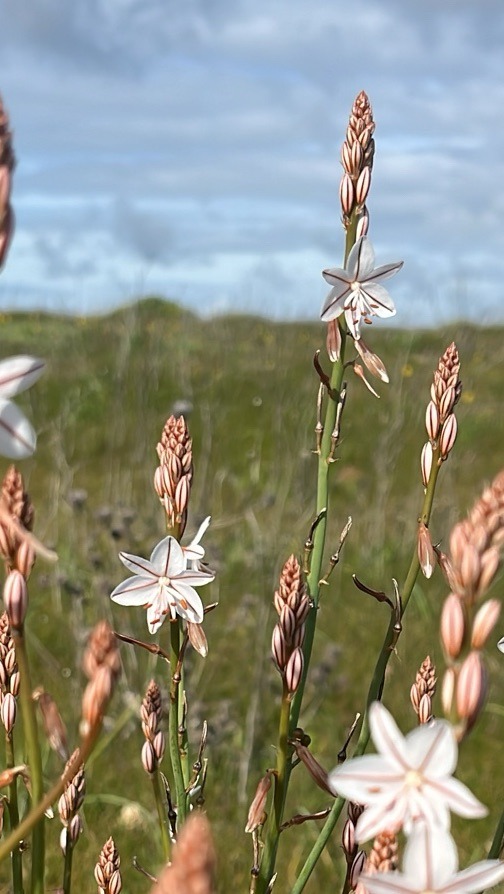
La noche cae sobre el patio. Sofocante, aire denso, pesado, caliente y acuoso. Casi se diría que sientes como se separa al pasar a través la mano, al agitarla para apartar uno de los bisbiseantes mosquitos que entran sin ser invitados a servirse un cóctel de tu sangre. También ellos, ¿por qué no? Estás delante de la mesa, sentada en la silla plegable de polipiel negra agrietada y de la q sobresalen hilachos blancos en cada desgarrón. Te gustaría estar en ropa interior, tal vez estarías más fresca. Pero por experiencia sabes que solo conseguirás ronchas y quedarte pegada a la silla. Prefieres conservar el holgado pantalón y la camisa de mangas largas de hilo de lino, arrugado y oscuro de sudor. Son tu único escudo ante esos vampiros diminutos y promiscuos. A saber de dónde vienen de picar. Al otro lado del patio de tierra apisonada, en la casa grande, han muerto ya tres criados. África es la madre, y como da, quita.
(…)
3 notes
·
View notes